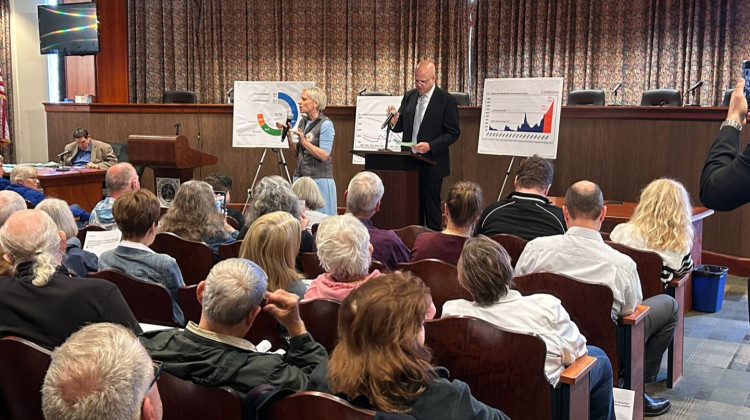
East Chicago Utilities Director Greg Crowley told residents that heavy machinery and soil excavation can knock loose lead in the city’s older service lines.
Nick Janzen/IPBS
The City of East Chicago, Indiana, told residents the high lead levels recently measured in drinking water in the Calumet neighborhood are likely the result of the efforts to clean up lead in the soil in the same area.
East Chicago Utilities Director Greg Crowley told residents at a public meeting that is all the information he can release right now.
“They provided us some preliminary results. They wanted to validate their results, so we do not have final data,” Crowley says.
The Environmental Protection Agency tested 45 homes in Zones 2 and 3 of the USS Lead Superfund site to determine if clean up activities were impacting the neighborhood’s drinking water. Eighteen homes did have elevated levels. Crowley explained that heavy machinery and soil excavation could cause vibrations that knock loose lead build up in the service lines that bring drinking water from water manes into peoples’ homes.
Crowley wants to see more testing done.
“I would like to see the EPA come in and do more evaluation to kind of help us better understand is this a phenomenon that’s occurring throughout our entire distribution system or is this just more of a localized phenomenon within that neighborhood,” says Crowley.
He says testing conducting earlier this year throughout the city shows East Chicago is in compliance with safe drinking water standards for lead, and residents can install filters or flush their water to reduce lead risk. Crowley says the city is looking into ways to help residents cover those costs.
About half a dozen residents spoke at the meeting, grilling Crowley, Mayor Anthony Copeland, and other city officials. Gilda Orange asked city officials to be open and provide accurate information.
“Our concern is when people leave here, we’re still here, I’m not going anywhere,” Orange says. “I’m going to die in my house and, whether it’s by lead, by cancer, by whatever, because we traded jobs for pollution a long time ago.”
 DONATE
DONATE







 Support WFYI. We can't do it without you.
Support WFYI. We can't do it without you.